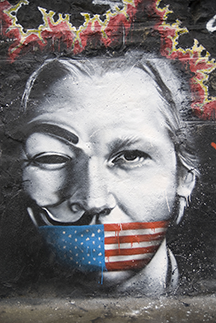The Political Meaning of Hacktivism
In an op-ed, Ashley Gorham, a doctoral student in political science, explores the zeal of WikiLeaks and the opinions of Anonymous.
In less than a decade, hackers have gone from marginal political actors to talking points at presidential debates. Hillary Clinton’s emails and Donald Trump’s 400-pound hacker are only the most recent evidence of hacking’s ascendance in the political sphere. Hacking’s popularity has verged on infamy at times. Fears of foreign spying, “unpatriotic” leaks, and cybercrime abound. Accounts of WikiLeaks and Anonymous, two of the most famous hacktivist forces, have been colored by these concerns. Contrary to these negative accounts, hacktivism can be a legitimate and effective form of political action. However, not all hacktivism is the same. In this article, I seek to differentiate the hacktivism of WikiLeaks from that of Anonymous by articulating the models of politics the two forms of digital activism represent. WikiLeaks’s fetishization of truth begets a technocratic politics, while Anonymous’s emphasis on opinion encourages a more democratic practice. Understanding this distinction helps to illuminate the particular implications of their political action, which are obscured by the conflation of the two hacktivist groups.
Click here to continue to the full version of the op-ed, which was originally published in limn.



